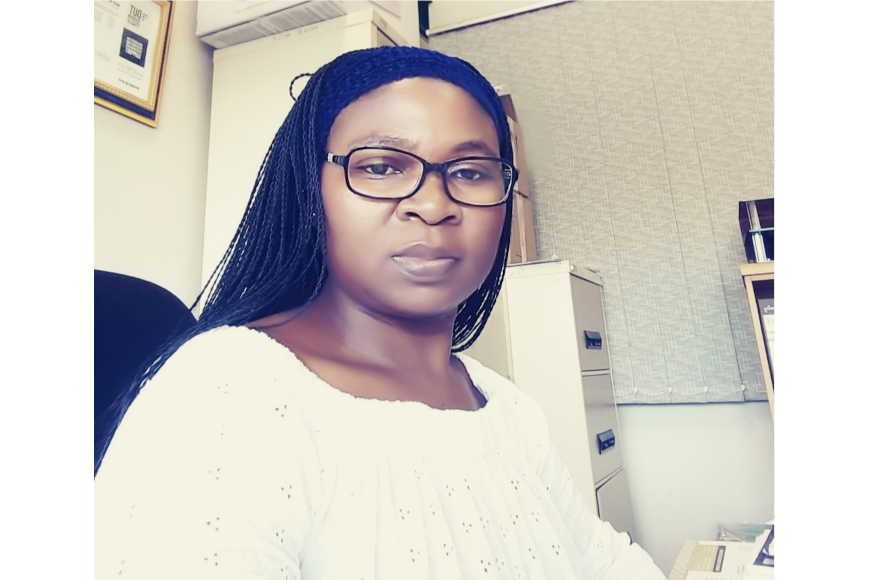The Durban University of Technology (DUT) continues to commend all its essential workers for their dedication and commitment in providing services to the community during the COVID-19 pandemic. DUT’s Communications teams Nomvelo Zulu spoke to Mary Mutanda, a Lecturer/Extended Curriculum Programme (ECP) Coordinator in the Department of Auditing and Taxation under the Faculty of Accounting and Informatics at DUT.
Q: Kindly tell me about your role at DUT?
A: “I am a Lecturer/Extended Curriculum Programme (ECP) Coordinator in the Department of Auditing and Taxation under the Faculty of Accounting and Informatics. I am responsible for coordinating the ECP in our department starting from vetting these students’ qualifications into the two programmes, enrolling them, teaching them Accounting Literacy in their first year and Taxation modules at different levels in their Auditing or Taxation qualification as well as tracking their progress throughout the four-year period they will be registered in this programme. If there are any of them struggling, I arrange for extra support for them to succeed in their studies, for example arranging for extra tutorials for them or psychological help depending on the cause of the problem. In addition, I teach Taxation1, 2, Tax Opinion Writing and Research Methodology to mainstream students as well as co-supervision of Tax Masters students in our department.”
Q: How long have you been in that role?
A: “I have been in this position for about 10 years now-from January 2013.”
Q: Please describe yourself in a few words?
A: “I am a passionate teacher and researcher who always finds fulfilment in my students’ success because I know that this qualification changes their lives. I am a compassionate, patient, and outgoing person, who always yearns to learn from others every day, even from my students.”
Q: How has it been like working during COVID-19?
A: “It was scary, and I was anxious at first since we had to learn so many digital teaching and learning methods at once. I was afraid of failing to deliver my best to my students and I was also worried about students failing to attend lectures due to a lack of resources or being tech-illiterate. It got exciting after mastering all the digital teaching methods – A big thank you to the CELT team for providing the training as well as sourcing more resources for teaching and learning. Now it is smooth sailing as I am now able to give a hand to colleagues and my students on these methods. I feel I am now techno-savvy.”
Q: How do you deal with the fear of contracting COVID-19 and losing loved ones due to this virus?
A: “I was very stressed during the initial peak in the whole world and before I got vaccinated and when my chance to get vaccinated arrived, I grabbed it with both hands. I am perpetually worried about losing a loved one to COVID-19 and hence I have become a preacher in my family about all of them getting vaccinated and observing the recommended COVID-19 health protocols.”
Q: What is your daily motivation?
A: “Run that you may Win. ‘Never stop when you are tired’, only ‘stop when you are done’ and ‘success is the best revenge’. These three quotes keep me going and help me to keep wanting to learn new things, finish whatever project I start and succeed. I always share these with my students to motivate them, therefore I am motivated by the evolution of my students especially those from disadvantaged backgrounds (who make up the bulk of our ECP students) when I see them improve in their academic performance every year, graduate and occupy big posts in industry or become successful entrepreneurs. I just ponder with admiration and appreciation to Higher Education and the Institution for the ECP. If it were not for this programme, these students could be somewhere back home languishing with no opportunity in site”.
Q: Please take me through a normal day in your life?
A: “My day starts at 9 am with a response to urgent emails and this runs throughout the day. I jot down tasks of the day according to priority and work on them and tick as I go along not forgetting to look at the previous day’s list and attend to unaccomplished items. I conduct my lecture, the earliest of which is at 10 am and soon after I go back to my list and attend to students along the way, if I get an opening I attend to my research, otherwise I prefer to work on my research reading and writing overnight when it is quiet and I can hear myself.”
Q: What do you like to do in your spare time?
A: “I like going to the gym, going out and about especially during weekends for some fresh air and a change of scenery as well as travelling. I try to watch my favourite soapie after a hard day’s work and current news every day – in my field I need to have current affairs on my fingertips.”
Q: If you had one wish what would it be?
A: “To afford disadvantaged students opportunities and resources for them to further their education as it is only education that can change their lives for the better and as reiterated by Nelson Mandela when he said, ‘Education is the most powerful weapon which you can use to change the world.’”


